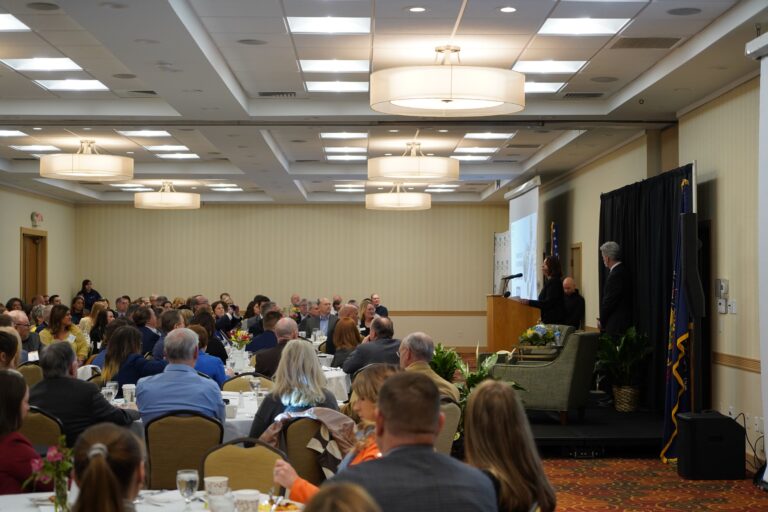State and federal elected officials joined CBICC President and CEO to discuss current public affairs, economic development, and issues impacting Centre County business.

The Chamber of Business & Industry of Centre County (CBICC) hosted its annual Legislative Breakfast on March 20, 2025, bringing together members of the business community and elected officials for discussions on issues impacting Centre County’s economy. The event convened approximately 150 attendees and was generously sponsored by Northwest Bank, Delta Development, One+ Strategies, Penn Highlands Community College Centre County, and The Pennsylvania Chamber of Business and Industry.
Held at Toftrees Golf Resort, the event featured one-on-one conversations with U.S. Congressman Glenn “GT” Thompson (PA-15) and Pennsylvania legislators Senator Cris Dush (PA-25), Representative Kerry Benninghoff (PA-171), and Representative Paul Takac (PA-82). Each official discussed updates on legislative priorities, economic development, workforce initiatives, and policies affecting local businesses with CBICC President and CEO Greg Scott.
“This event underscores CBICC’s commitment to connecting the business community with elected officials and providing a platform for discussions on policies affecting local businesses,” said Scott. “As we continue to implement our Economic Development Strategic Plan through thoughtful investment in focuses such as business retention and expansion, workforce and education, housing, and infrastructure, these conversations help align efforts to drive smart, sustainable growth in Centre County.”
Congressman Thompson, who chairs the House Agriculture Committee, discussed federal policies impacting Centre County, emphasizing the importance of supporting Pennsylvania’s farmers and ensuring economic stability.
“Agriculture is food security and economic security – it’s an essential industry,” remarked Thompson. “The bipartisan Farm Bill will ensure Pennsylvania’s farmers, especially small and medium-sized operations, have the resources they need to thrive.”
Thompson also highlighted efforts to expand global markets through trade deals, contending that recent tariff activity should be seen not as a trade war, but as a broader economic strategy to compete globally.
Considering ongoing discussions about the future of the U.S. Department of Education, Thompson said he remains focused on ensuring that student and workforce development programs continue to receive necessary federal support. He also addressed the proposed 15% cap on Facilities and Administrative costs for National Institute of Health grants – a change that could result in a $41.4 million annual loss for Penn State University. Thompson emphasized the need for universities to clearly demonstrate the return on investment from federal research funding.
On the state side, Senator Dush discussed the possible closure of SCI Rockview, noting the importance of transparency in determining the site’s future and maximizing economic development opportunities and family-sustaining jobs.
“We will be pushing for transparency in making sure the Department of Corrections is making the right decision if we’re going to be shutting down Rockview,” said Dush.
Regarding state government relations, Dush raised concerns about regulatory barriers and encouraged efforts to reduce red tape for infrastructure and business development.
In his conversation with Scott, Representative Benninghoff discussed state budget priorities and shared updates on major infrastructure initiatives including the I-80/I-99 high-speed interchange project and the Route 322 corridor project, sharing that a decision on the 322 route is expected by the end of 2025.
“With 44,000 miles of road and 24,000 bridges in Pennsylvania, we’re tackling infrastructure challenges head-on, especially in smaller, rural areas like Centre County,” noted Benninghoff, confirming that PennDOT will meet with local leaders in June 2025 to discuss connectivity improvements including better access to the University Park Airport.
Representative Takac further emphasized the importance of community involvement in decisions about SCI Rockview’s future, noting the prison’s estimated $120 million annual economic impact. He identified potential opportunities for long-term growth at the site and called for consideration of community needs throughout the process.
“We have a fiduciary duty to do the best we possibly can for everyone affected by the decision to potentially close SCI Rockview,” shared Takac. “There are many factors that go into this, and we need complete transparency and accountability so that, even if Rockview closes, we take advantage of all available resources and ensure the best possible outcome for everyone in the community.”
Takac also highlighted the potential role of agritourism and agriculture innovation in rural revitalization, called for incentives to support development of attainable housing, and discussed strategies to better attract and retain residents, businesses, and visitors to Centre County.
The annual Legislative Breakfast is part of the CBICC’s ongoing Voice of Business event series, designed to connect the business community with industry, government, and business leaders and provide a platform for meaningful discussions on the issues shaping Centre County.
